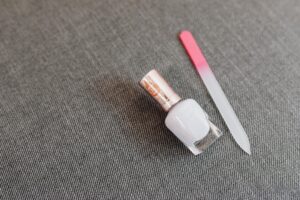Nail Care Facts

Nails play an important role in our overall appearance, and taking care of them is essential for maintaining healthy and beautiful hands. However, there are many misconceptions and myths surrounding nail care that can lead to confusion and potentially harm our nails. In this blog post, we aim to debunk common nail care myths and shed light on the truth behind them. By understanding the facts, you can adopt proper nail care practices and promote the health and strength of your nails.
Myth 1: Trimming Your Cuticles Is Necessary for Healthy Nails
The Truth: Contrary to popular belief, trimming or cutting your cuticles is not necessary and can actually do more harm than good. Cuticles act as a protective barrier for the nail bed, preventing bacteria and infections from entering. Pushing back the cuticles gently after soaking your hands in warm water is sufficient to maintain their neat appearance without causing damage. Overzealous cutting or trimming of cuticles can lead to infections, redness, and even permanent damage to the nail matrix. Instead, focus on keeping your cuticles moisturized with cuticle oils or creams to promote healthy nail growth.
Myth 2: Nails Need to Breathe, so You Should Avoid Wearing Nail Polish for Extended Periods
The Truth: Nails are composed of non-living keratin, and they do not require “breathing” like our skin does. Wearing nail polish for extended periods does not suffocate or weaken the nails. In fact, applying a base coat, two layers of polish, and a top coat can actually provide a protective barrier that prevents moisture loss and strengthens the nails. However, it is essential to give your nails a break between manicures to allow them to rehydrate and recover. Regularly moisturizing the nails and using acetone-free nail polish removers can also help maintain their health and prevent dryness.
Myth 3: Regular Gel or Acrylic Manicures Will Ruin Your Natural Nails
The Truth: When done correctly and by a professional, gel or acrylic manicures should not ruin your natural nails. The key lies in proper application, maintenance, and removal. Rough and improper removal techniques can cause damage to the nail plate, leading to thinning, peeling, or breakage. It is crucial to choose a reputable salon and nail technician who follows safe procedures. Additionally, taking breaks between manicures, using cuticle oil, and nourishing your nails with strengthening treatments can help maintain their health and prevent any potential damage.
Myth 4: Applying Nail Hardeners Makes Nails Stronger
The Truth: Nail hardeners are often misunderstood. While they may provide a temporary strengthening effect, prolonged and excessive use can actually make the nails more brittle and prone to breakage. Hardening treatments contain ingredients that can dehydrate the nails, leading to dryness and increased brittleness. Instead, focus on nourishing the nails with moisturizing products, like nail oils or creams, which can help improve their flexibility and overall strength.

Myth 5: White Spots on the Nails Indicate a Calcium Deficiency
The Truth: Contrary to popular belief, white spots on the nails are usually not a sign of calcium deficiency. In most cases, they are caused by minor injuries to the nail bed, such as bumping or tapping the nails against hard surfaces. These spots, known as leukonychia, are harmless and will grow out with time. True calcium deficiency rarely manifests as white spots on the nails. If you are concerned about your calcium levels, it is best to consult a healthcare professional who can assess your overall health and provide appropriate guidance.
Conclusion:
By debunking these nail care myths, you can approach your nail care routine with confidence and knowledge. Remember to prioritize proper nail hygiene, moisturize regularly, and give your nails the care they deserve. If you have any concerns about your nail health, it’s always best to consult with a healthcare professional or a licensed nail technician who can provide personalized advice based on your specific needs.




